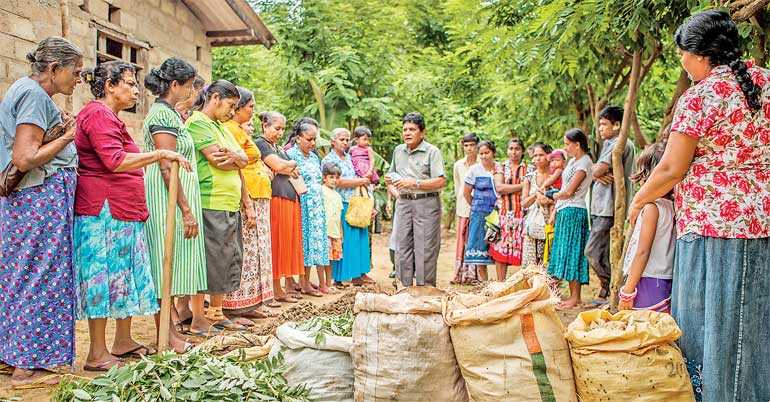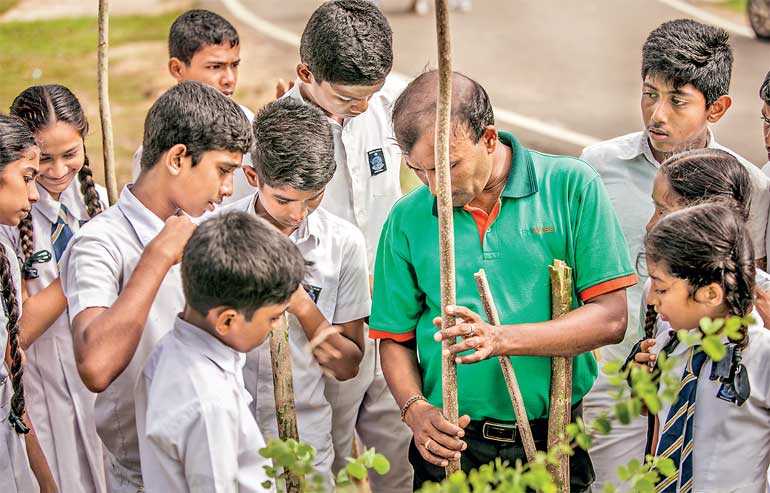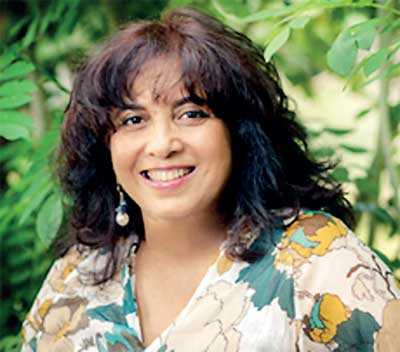Friday Feb 27, 2026
Friday Feb 27, 2026
Monday, 24 June 2019 00:00 - - {{hitsCtrl.values.hits}}


In creating Biomass Ventures, I have not been afraid to ‘think big’, because I have recognised that the opportunity for our business is massive and because I understand that the needs that we are addressing are monumental. In effect, we achieve ‘Sustainable and Ethical Fuel + Livelihood Development + Food’ in rural Sri Lanka, in a holistic, inclusive, financially-viable business model. We have created an innovative approach to sustainable biomass production, simultaneously mitigating climate change, enhancing food production, promoting soil conservation, and advancing economic, social and environmental well-being especially for smallholder farmers. 
In 2006, my London-based publishing house, Dakini Books, published ‘Global Warning – The Last Chance for Change’, Paul Brown's fact-based critically acclaimed book on climate change. Researching this book gave me phenomenal insight into the climate change consequences for our planet, and led me to think ‘Why not start a renewable energy business and, in the country of my birth – Sri Lanka?’
Between 2009 and 2011, my time was spent on R&D. The agri-energy sector in Sri Lanka, although poorly organised, has immense potential. Biomass is already a widely-used energy source for household cooking in rural areas, for drying tea in tea factories and in garment boilers for producing steam and even electricity, but its sourcing is unsustainable in its present form. Outgrower schemes, although prevalent in the tea and coconut sectors, were non-existent in the biomass sector. Thus, our primary focus from the start has been on developing a robust and sustainable biomass supply chain to serve as the basis for a downstream expansion into value-added pellet manufacturing and sustainable biomass generated power. I also appreciated the compelling opportunity for biomass power to transform rural development in the country.
My work during this time resulted in the establishment of Biomass Group (Biomass Ventures – Singapore Holding Company) – a vertically integrated, sustainable energy business that develops biomass resources to produce pellets and power. At its core, Biomass Ventures is a profitable, socially responsible business. Through Biomass Supplies, a wholly-owned subsidiary, we directly source biomass feedstock primarily from smallholder farmers but also from plantations, the Catholic Church, and Buddhist temples, etc. In the process, we generate millions of tons of commercial biomass – without owning a single parcel of land1.
Our outgrower model is designed to deliver socio-economic impact for our supply partners, which in turn ensures our security of supply. Since start of business in March 2013, we have directly registered to our outgrower program more than 50,000, mainly smallholder farmers, who have collectively planted approximately 100 million Gliricidia trees. By partnering with other companies and institutions, we are on track to increase this number to 200,000 farmer suppliers by the end of 2020. As we scale our operations, we envisage registering 500,000 farmer suppliers across Sri Lanka – who will support planting 1 billion Gliricidia trees. We can sustainably deliver socio-economic impact at scale which will have a radically positive transformative impact on Sri Lanka’s energy and food nexus.
The primary biomass crop used is ‘Gliricidia sepium’, a rapidly growing, short-rotation tree that is found growing wild throughout Sri Lanka. A native plant of Mexico and Central America, Gliricidia was introduced to Sri Lanka in the 18th century to provide shade to coffee plants, of which Sri Lanka was once the world’s largest producer, and is now pervasive across the country. Gliricidia is a nitrogen-fixing soil improver. In addition to its use as ‘live fencing’ by smallholders, its leaves and bark can be used as a highly effective, organic fertiliser and pesticide and it’s highly effective for intercropping as a shade tree.
Our outgrower model is designed to deliver socio-economic impact for our supply partners, which in turn ensures our security of supply. Since start of business in March 2013, we have directly registered to our outgrower program more than 50,000, mainly smallholder farmers, who have collectively planted approximately 100 million Gliricidia trees. By partnering with other companies and institutions, we are on track to increase this number to 200,000 farmer suppliers by the end of 2020. As we scale our operations, we envisage registering 500,000 farmer suppliers across Sri Lanka – who will support planting 1 billion Gliricidia trees. We can sustainably deliver socio-economic impact at scale which will have a radically positive transformative impact on Sri Lanka’s energy and food nexus.
Supplies maintain positive, long-term relationships with our farmer suppliers as they are the centre of our operations. Initially farmers were wary, but we have diligently worked to gain their trust over these last five years. We have organised over 700 training programs where we share knowledge on how Gliricidia can increase soil productivity, while reducing erosion and soil contamination associated with the use of chemical fertilisers. Our outgrower model enables farmers to reduce spending on agrichemicals, which improves environmental ecosystems by reducing chemical fertiliser and pesticide runoff.
When the civil war ended in Sri Lanka in 2009, there was high unemployment especially amongst women who have few other economic opportunities. Today over 80% of our contact with our registered smallholder farmers is with the woman of the household. Any income they earn is a supplement to household income and is usually spent on family well-being and on children’s education. What we do, and the way we work, makes good business sense. Keeping our farmers engaged is a means to ensure the security of supply. Farmers will remain on their land instead of migrating to cities, and we achieve the security of supply necessary to enable the Pellet and Power segments of Biomass Group to become long-term stable revenue generating companies.
In creating Biomass Ventures, I have not been afraid to ‘think big’, because I have recognised that the opportunity for our business is massive and because I understand that the needs that we are addressing are monumental. In effect, we achieve ‘Sustainable and Ethical Fuel + Livelihood Development + Food’ in rural Sri Lanka, in a holistic, inclusive, financially-viable business model. We have created an innovative approach to sustainable biomass production, simultaneously mitigating climate change, enhancing food production, promoting soil conservation, and advancing economic, social and environmental well-being especially for smallholder farmers.
Contributing to achieve Sustainable Development Goals (SDGs) is at the core of our business. In 2017, we developed an impact monitoring and reporting framework based on SDGs. In the process, SDG1, SDG2, SDG5, SDG7 were identified and prioritised as achievable during the normal course of business activities (direct). Further, business model can facilitate to contribute to achieve SDG3, SDG4, SDG9, SDG10, SDG12, SDG15 and SDG17 with extra efforts made (indirect).
Our journey to create an ethically-sourced sustainable supply chain for biomass was challenging but solid and self-evident. In 2015, Supplies achieved Roundtable on Sustainable Biomaterials (RSB) as the first company in South Asia. In 2012, we became a member of United Nations Global Compact and later pledged our support for global initiatives like Business Call to Action. In 2018, Supplies was selected as one of the first companies selected for Business Call to Action Impact Champions Programme. Recently, I won the Global Green Economic Forum (GGEF), Women Eco Game Changer Award, 2019.
Having established a viable, secure Supply model during the past five years, we are now at the right stage to launch our downstream expansion into ‘Pellets and Power’. We provide a world-class demonstration of what can be achieved when we work toward a truly sustainable, inclusive business. My ambition is to transform the livelihoods of agricultural communities across Sri Lanka whilst building a successful, profitable business.
1 Smallholder farmers mostly plant Gliricidia as a live fence and plantations primarily intercrop Gliricidia for the leaves which are used as fertiliser. In neither case are food crops displaced.